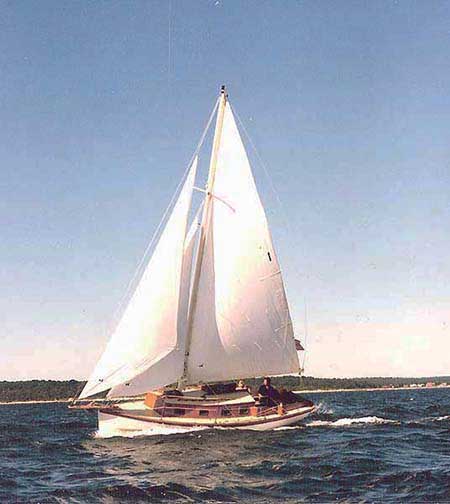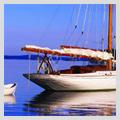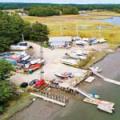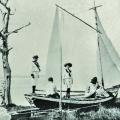The Scream
 Oriana is shown motor sailing past the oldest lighthouse in the United States, Boston Light. Painting by Steve Brookman
Oriana is shown motor sailing past the oldest lighthouse in the United States, Boston Light. Painting by Steve Brookman
“Don’t you ever do that to me again!” screamed my crew, a fellow pilot and a senior captain for my airline, who’d been roused from a seasickness-induced slumber by the sound of the swinging boom and slatting main. In a building breeze, I’d gone forward on deck to handle sails, so when he scrambled from the berth below and saw no one at the helm, just the blackness of that night and the howling wind, he panicked.
It was his first time on a sailboat, and we were ferrying my Oriana, a 26-foot full keeled Herreshoff-ish cutter, from Portland, Maine, to Boston on a tight schedule, which is never a good situation to be in. But there we were just off the Isles of Shoals, with miles left to go and conditions worsening.
Oriana had been built by Golden Era Boats and launched in Noank, Connecticut, the previous year. My brother, who was living on Peaks Island, sailed with me from Noank to Maine where we spent the all-too-short summer exploring the coast— when fog and wind permitted. I had to take Oriana back south at the end of August so she could be shown at a September boat show.
It was early in my aviation career and I was flying as a copilot on a Boeing 747. My usual work schedule was to take off from Newark, New Jersey, late in the afternoon, fly the red-eye across the Atlantic, and land in London in time for their breakfast. Just 24 hours later, after trying, unsuccessfully, to catch up on missed sleep, it was time for a much longer flight back to Newark. I would then hop a flight to Portland, take a taxi downtown, wait for the ferry to Peaks Island, hike to my brother’s house, get out of my uniform, find my dinghy hauled up on the rocky shore, row out to Oriana on her mooring, and then, finally, collapse in the cockpit. A couple of days later: repeat the process. Ah, the glamorous life of an international pilot!
While riding the crew bus after one trip, I ran into Davis, a 747 captain with whom I had flown recently. We had discussed sailing during our flight, and on the bus, he asked if he could join me sometime to see if boating was something he’d want to pursue. I told him I was heading to Portland that weekend to ferry Oriana to Boston and he was welcome to join me. But I warned it would not be a pleasure trip, as I had to attend my captain’s upgrade class in Newark on Monday morning.
I picked him up along with some supplies at 8 a.m. the next Friday at Portland’s commercial waterfront. By 10, Portland’s skyline faded away as we made fair progress reaching with light southeast winds.
It didn’t take long for the rocking motion of the boat to send Davis down to the quarter berth to deal with his queasy stomach. He’d pop up once in a while, but by 8 that night, the wind had picked up ahead of an approaching front, and that sent him below and kept him there. I reduced sail before he retired, changing out the drifter for the yankee jib, and prepared for a long solo night watch.
By 2 a.m., we were abeam the Isles of Shoals, with the wind now gusting over 25 knots, and I needed to take down the yankee and tuck a reef in the main to keep us under control. At the time, I did not have an autopilot and used a tiller comb to lock the tiller in place and help with steering. Of course, once the sail trim was changed, Oriana became pretty clueless about what heading to maintain. So, while I was on the bowsprit gathering in the jib (with harness on), the mainsail alone caused the boat to round up into the wind, with the luffing sail making quite a racket.
That’s when Davis woke up and charged up the companionway. Seeing an empty cockpit, he quickly spun around with the widest eyes imaginable and spied me in the darkness, wrestling the sail. That’s when he screamed, and I had to remind him that I was the captain now and responsible for his safety and that of the boat. He eventually calmed down, but I’m not sure if he ever let himself fall back to sleep.
 Oriana reaching in Long Island Sound soon after her launch. Photo courtesy Steve Brookman
As we made our way closer to Boston, the wind increased and stayed well above what was forecast. We rounded Cape Ann at 8 a.m., with wind in the 35-knot range. By the time we reached the point at which we could turn and set our final course into Boston Harbor, the wind was gusting into the 40s, and of course, it was right on our nose. The only way we could make progress was to motor-sail. We made headway as the single-cylinder Yanmar diesel thumped away, but we could have walked faster.
Oriana reaching in Long Island Sound soon after her launch. Photo courtesy Steve Brookman
As we made our way closer to Boston, the wind increased and stayed well above what was forecast. We rounded Cape Ann at 8 a.m., with wind in the 35-knot range. By the time we reached the point at which we could turn and set our final course into Boston Harbor, the wind was gusting into the 40s, and of course, it was right on our nose. The only way we could make progress was to motor-sail. We made headway as the single-cylinder Yanmar diesel thumped away, but we could have walked faster.
It was a brilliant, cloudless day. Waves, blown flat by the stiff breeze, and the constant spray of foam and spindrift encrusted our sunglasses. And because we were heeling hard with the rail down, the head could not be pumped on that tack, adding to the joy of this trip.
We had both flown this approach to Boston’s Logan Airport many times, and now watched the jets overhead covering the distance in a few minutes, not the 10 hours of beating that we were enduring.
We eventually made it into the harbor, but many hours later than planned. We did have a bit of luck, though, when Hewitt’s Cove Marina in Hingham, a suburb of Boston within the harbor, answered my hail and provided us with a berth. Not only was it available, there was a ferry dock at the marina and a boat that could take us to Logan, albeit in the morning due to our late arrival. After a well-deserved dinner at a nearby restaurant and a sound—and quiet—night’s sleep, we snagged the early ferry and then caught a flight to Newark. It was a heck of a commute but I was only a few minutes late for my captain’s class.
There are a few lessons to be learned from this adventure. First, the need to be prepared for whatever Mother Nature throws at you, even on a short coastal cruise in sight of land. Next, the importance of a thorough briefing. As an airline pilot I know that well. Briefings are mandatory for all stages of a flight. Even though Davis was my captain when flying, on Oriana he was a newbie, and should have been briefed accordingly.
In the end, I was impressed by the marina where we landed, and booked a slip there for the following year. And Davis? That trip pegged his fun meter and cured him of his boating fever for a few years. But the passage of time smooths the rough edges of our memories, and I understand he is now enjoying being on the water in a boat of his own.
✮
Steve Brookman is retired from the airlines and lives on the shore of Blue Hill Bay with his wife, Susan. He spends his time volunteering to build small boats, using them on occasion, and painting in watercolors and egg tempera, when the boats are hauled. He organizes the Blue Hill Maritime Heritage Festival, which will take place on Saturday, August 3, 2024.
Related Articles
Share this article:
2023 Maine Boat & Home Show

Join Us for the Maine Boat & Home Show!
Art, Artisans, Food, Fun & Boats, Boats, Boats
August 11 - 13, 2023 | On the waterfront, Rockland, Maine
Click here to pre-order your tickets.
Show is produced by Maine Boats, Homes & Harbors magazine.















